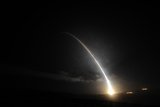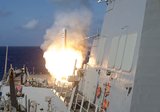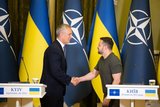British military called upon for nerve agent investigation
British police requested military assistance in investigating a nerve agent attack on a former Russian double agent as speculation mounted about how London could respond if a state actor were to blame.
Police extended the cordon around the modest suburban home of Sergei Skripal in Salisbury, England where he and his daughter Yulia were found slumped on a bench on 4 March.
The pair remain unconscious in a critical but stable condition, while Nick Bailey, one of the first police officers on the scene, is now sitting up and talking after initially being admitted to intensive care.
With police also hurt in the attack, pressure is intensifying on Prime Minister Theresa May to find and punish the culprits.
The involvement of 'a British citizen, especially a policeman, requires the immediate and strong involvement of the British authorities,' Chatham House analyst Mathieu Boulegue told AFP.
Around 21 people have been treated, according to Kier Pritchard, chief constable for Wiltshire Police.
'A number of those have been through the hospital treatment process, they're having blood tests, they're having treatment in terms of support and advice,' he said.
Authorities are racing to find the source of the nerve agent used against 66-year-old Skripal, who came to Britain in 2010 as part of a spy swap, as politicians warned it bore the hallmarks of an attack by Russia.
National counter-terrorism police, who are leading the investigation, announced on Friday that they had requested assistance from the military 'to remove a number of vehicles and objects from the scene'.
'Military assistance will continue as necessary during this investigation,' they added, with media reporting 108 personnel may be involved, including Royal Marines and chemical specialists.
Defence Secretary Gavin Williamson said the armed forces 'have the right people with the right skills' to deal with the 'crucial inquiry'.
During a visit to the site on Friday, interior minister Amber Rudd called the attack 'outrageous' but urged people to 'give the police the space they need to really go through the area carefully, to do their investigation'.
In response to questions over Russia's possible involvement, May has said that 'if action needs to be taken then the government will do that'.
Possible responses include the expulsion of some of Russia's 58 diplomats, some kind of boycott of the 2018 football World Cup or an increased British military presence in eastern Europe.
Foreign Secretary Boris Johnson floated the idea of deepening sanctions against Russian officials, but Britain would have to persuade its international partners.
Moscow has reacted angrily to the accusations it was involved, with Foreign Minister Sergei Lavrov on Friday dismissing them as baseless 'propaganda'.
On Wednesday, however, Russian state TV presenter Kirill Kleimyonov had appeared to deliver a veiled warning, saying: 'Don't choose England as your future country of residence... whether you are a professional traitor to the motherland or whether you hate your country in your spare time.'
Analyst Boulegue said it would be 'extremely difficult' to pinpoint who committed the attack, and that the response could be a lot more complicated if it turned out that internal factions were responsible.
More from Defence Notes
-
![US lawmakers warn that “more military spending is absolutely necessary” to ensure Pentagon’s readiness]()
US lawmakers warn that “more military spending is absolutely necessary” to ensure Pentagon’s readiness
The US Congress has raised concerns about how inflation rates and cuts in main acquisition programmes could affect the US military.
-
![Can the US overcome Russian and Chinese nuclear capabilities?]()
Can the US overcome Russian and Chinese nuclear capabilities?
Washington’s ageing inventory and the pace Moscow and Beijing have been modernising their capabilities put in check the US Nuclear deterrence.
-
![US FY2024 funding package passes as China closes military capability gap]()
US FY2024 funding package passes as China closes military capability gap
The Pentagon has been operating under temporary funding since October 2023, which has impacted its main acquisition and development programmes, increasing the capability gap between the US and China.
-
![NATO outlines future challenges as Ukrainian funding from US stalls]()
NATO outlines future challenges as Ukrainian funding from US stalls
In 2023, defence spending increased by an unprecedented 11% across European NATO countries and Canada. Since 2014, the group has spent an additional US$600 billion on defence.
-
![US Pentagon to reduce investments in main acquisition programmes over FY2025]()
US Pentagon to reduce investments in main acquisition programmes over FY2025
The DoD requested nearly US$850 billion to fund operations over the next fiscal year. Despite the amount being 1% higher than the FY2024 budget request, it has not covered the 3% inflation rate, which could impact the DoD’s main programmes in the medium and long term.























